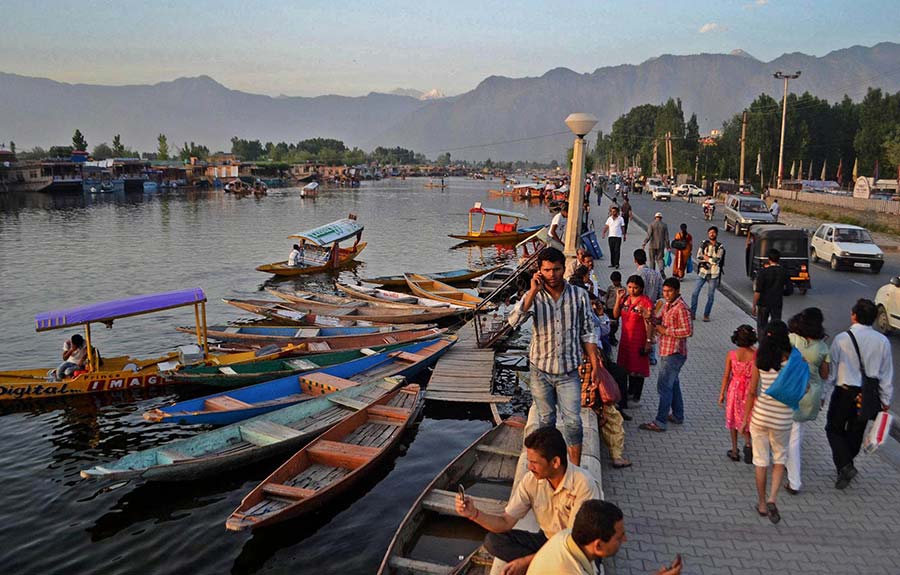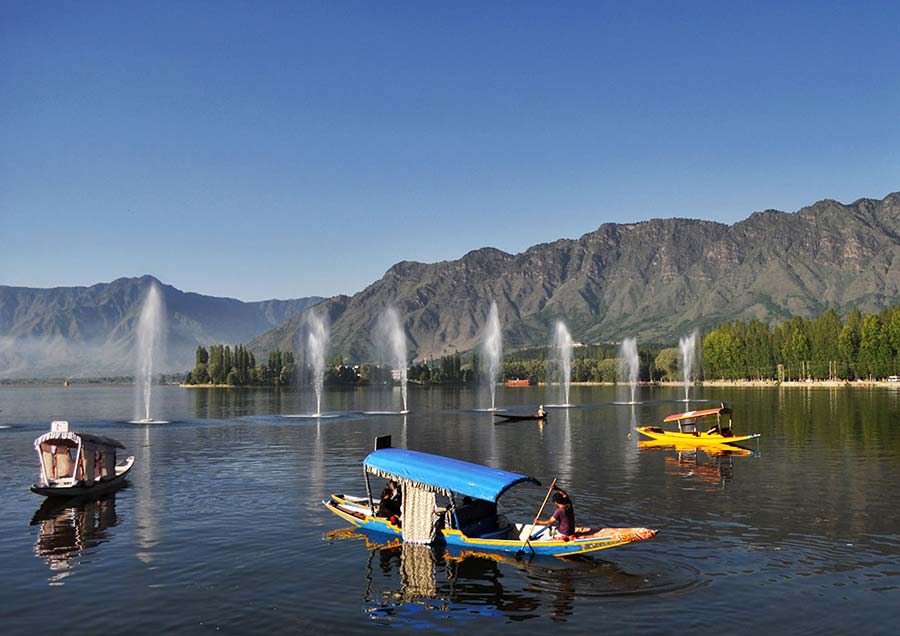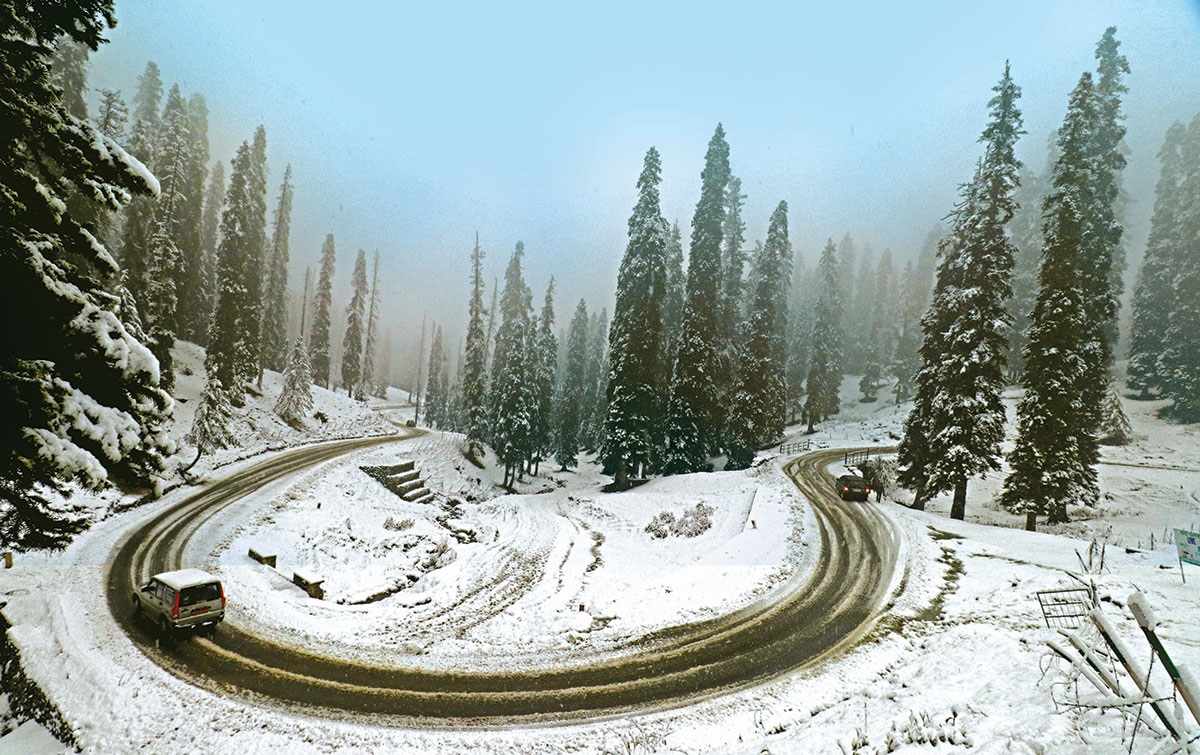As bad TV used abusive lung power to defame Kashmir, it impacted a promising tourist season. With hotels running empty and luxury transport grounded, Aakash Hasan meets people who have shifted priorities to sustain lives
 “Batamalo, Lal-Chowk, Qamarwari, Batamalo,” an unusually decent young bus conductor is yelling for passengers at Dalgate, Srinagar’s main tourist landing point.
“Batamalo, Lal-Chowk, Qamarwari, Batamalo,” an unusually decent young bus conductor is yelling for passengers at Dalgate, Srinagar’s main tourist landing point.
As the bus starts moving a passenger enquires from this young man: “How can I visit Gulmarag but on cheap rate?” The passanger is a south Indian tourist and wants to explore Kashmir with his limited budget.
As Sajad, the bus conductor responded, it created a scene literally. All commuters in the bus were spell bound, not becase of usual attitude of a conductor but because of his polished, unflattering English. He guided the tourist politely and accrately. “You speak so good English. You must be good educated, beta,” a white beard man in his sixties asked. Tall and smart boy with thin beard, he smiles and turns shy. “I have done a diploma in hotel management,” he responds, at another bus halt, in calm voice and then shakes his head and takes a deep breath.
This 21-year-old, Bandipora resident is another tale of sustenance amid shattering due to the prevalent uncertainty in Kashmir.
“I was working in a hotel and was being paid Rs 8000, a month,” Sajad said. But after the killing of Burhan Wani, Dar’s fate changed.
“Our hotel was fully booked by the tourists but within days they left.”
The hotelier asked his staff to go home and return after the situation improves within a few weeks. “But those two weeks passed into months and I was sitting idle at home listening to the news of killing and bloodshed,” Sajad explained. It was only after five months that he visited Srinagar.
Till then ‘winter’ had arrived in valley and the hotels were desolate. “I was asked to go back home by the manager who was lamenting for his own job,” remembers Dar.
Idle for these months, Sajad begun working as a laborer around his village to sustain his life. He hoped that now in spring he will get a decent job.
Sajad returned to Srinagar in March. “My manager told me that they can hire me from next month only if I can work on Rs 3000. It was manager’s favor because of my family background.”
For him it was not sustainable and he had to look for something else. He later contacted his distant relative in Srinagar and lamented the woes. One relative being driver of a mini-bus offered him the job of a conductor. Salaray: Rs 4000 plus daily tip and free lodging at driver’s home.“Sustenance apart, I have to do any odd job to keep my family surviving,” Sajad said. “I cannot even work back home, the friends would taunt me for studying hotel management and ending up as a bus conductor.”
After July eight, everything was shattered in Kashmir valley. The 2016 season was counted as one of the best tourism years for valley.
“Last year these days there was not a single room left and the rooms were booked in advance for next three months,” said Manager of hotel Grand Mumtaz Pahalgam. Similar rush was at other big and small hotels, he says.
“We had to hire additional workforce and it was highest as compared to other years.”But these days the hotel lobby is desolate occasionally a tourist walks. The receptionist is wearing a languid look.
Last year at this hotel, as per management there were around two hundred people working. “This year the number is not even hundred,” he said, insisting there is no occupancy.
“Out of 150 rooms only 25 are booked that too on less rates compared to last year.”
The week 2nd before Ramzan, Pahalgam was jam packed but it would hardly matter for the hoteliers, who feel dried-up. “These were only local tourists, most of whom visit with lunch in carry bags,” quipped a hotelier.
Statistics available state tourism department suggested a total of 12,99,112 tourists, including 24, 516 foreigners, visited J&K in 2016. The figre is 371,297 more than 2015. Had there been no change in situation the stakeholders in tourism say the figures would have been highest in the decade.
The months of April, May and June is the peak season for tourism in Kashmir. But this year officials say that not even one third of 2016 arrived. “We can give figures only at the end of the year but roughly less than 50 percent than previous year has come,” Mahmood Ahmad Shah, Director Tourism, said.
“The situation of the sector is very pathetic and we are making efforts to alter the sitation. But any small incident wipes out our work. We conducted road shows in different states and now we are going to go with more advertisements in TV and print at national level.”
Tour professionals, however, say the footfalls are below 15 percent. “There were few bookings in earlier months but as by-elections witnessed violence, bookings were cancelled,” one senior hotelier said.
Air traffic is an indicator of the fall. Officials at Srinagar Airport said that last year on an average around 37 flights would land. However this year the number has fallen down by ten fights per day.
 “It is a big deal that ten flights have reduced,” atrade insider said. “Those people flying to Srinagar are expected to spend as compared to those who arrive in buses with LPG stoves in the dicky.”
“It is a big deal that ten flights have reduced,” atrade insider said. “Those people flying to Srinagar are expected to spend as compared to those who arrive in buses with LPG stoves in the dicky.”
A failed tourist season has the same cascading effect that a good year has, albeit negative. Transport sector is tense. Bilal Ahmad, a resident of Bemina, is the proud owner of Innova that cost him Rs 14 lacs.
“I had to take Rs 10 lacs of bank lone in January 2016,” Bilal said. “I was sure it is the work of just two years that I would get rid of bank loan.”
So far, he was able to return Rs 4 lakcs and was managing his four member family with ease.
“The work was so good that some of my friends would tease me that Innova made us lucky, Bilal said. “There was not a day to rest as tour operators would insist that it is important.”
But after Burhan’s killing, things changed fast. “It is depressing me,” Bilal said. “There is bank loan, surging interest and no income but the expenses are same.”
This season he has not managed to return half of what he did last year. He is
thinking to sell-off vehicle and work somewhere else. Since January he parks his car in TRC stand. For last three days has been waiting for his turn!
Estimations made last year suggest state’s net loss is Rs 3,000 crore if a tourist season fails. While hoteliers have now turned towards estates department other stakeholders are managing to stay afloat.
“This year we have received highest number of applications, perhaps in a decade, from the hoteliers for registrations of hotels by estates department,” said an official in Estates department of the state.
Estates department every year hires hotels in Srinagar for employees who either move with secretariat or hail from far flung places. State hosts them in hotels free and feeds them without any costs.
“Earlier those hotels would apply for the government renting who were not doing good business with tourism. Now top hotels, of the city applied this year,” the official said.
However, these options are not available for the hoteliers out of Srinagar and other people associated.
Riyaz Ahmad (name changed), a young chef planned to open restaurant with specialization in south-Indian cuisines. He used to work in a restaurant in Mumbai and nourished his skills there.
“It was my dream to offer wide range of south Indian foods here in valley because most of the tourists from southern states don’t like other food,” Ahmad said. He worked on his project for a year and finally decided to throw open restaurant near Mattan on Khanabal-Pahalgam road. But he returned to Mumbai.
“I cannot afford risk with such a large investment.”
Hoteliers, transporters, Shikarawalas and other people associated with the travel sector are living uncertain lives, says a top business man. “It is better not to invest in this sector because it is unpredictable.”
Another top hotelier of the valley said that last year they sent a team of their staff to foreign countries under exchange program. “It was meant to make them learn international standards because our services are far behind in international standards,” he said. “But now this year I couldn’t employ them all and they are sitting back home doing some other work. It is how our talent is wasted.”
Given the lesser footfall of Kheerbhawani pilgrims, aimed whispered campaign, Amaranth Yatra is likely going to be low key affair this year.
The stakeholders blame Delhi’s electronic media for destroying Kashmir as a tourist destination.
“Media particularly the TV Channels will have to play an important role,” says an official in the department of tourism. It was this view that Chief Minister is frequently talking about.
Official are positive that sitation can improve if nothing happens for some time. “If situation will remain a bit calm people in the sector could at least keep going with the business,” one official said. “Industry is in great danger.”















